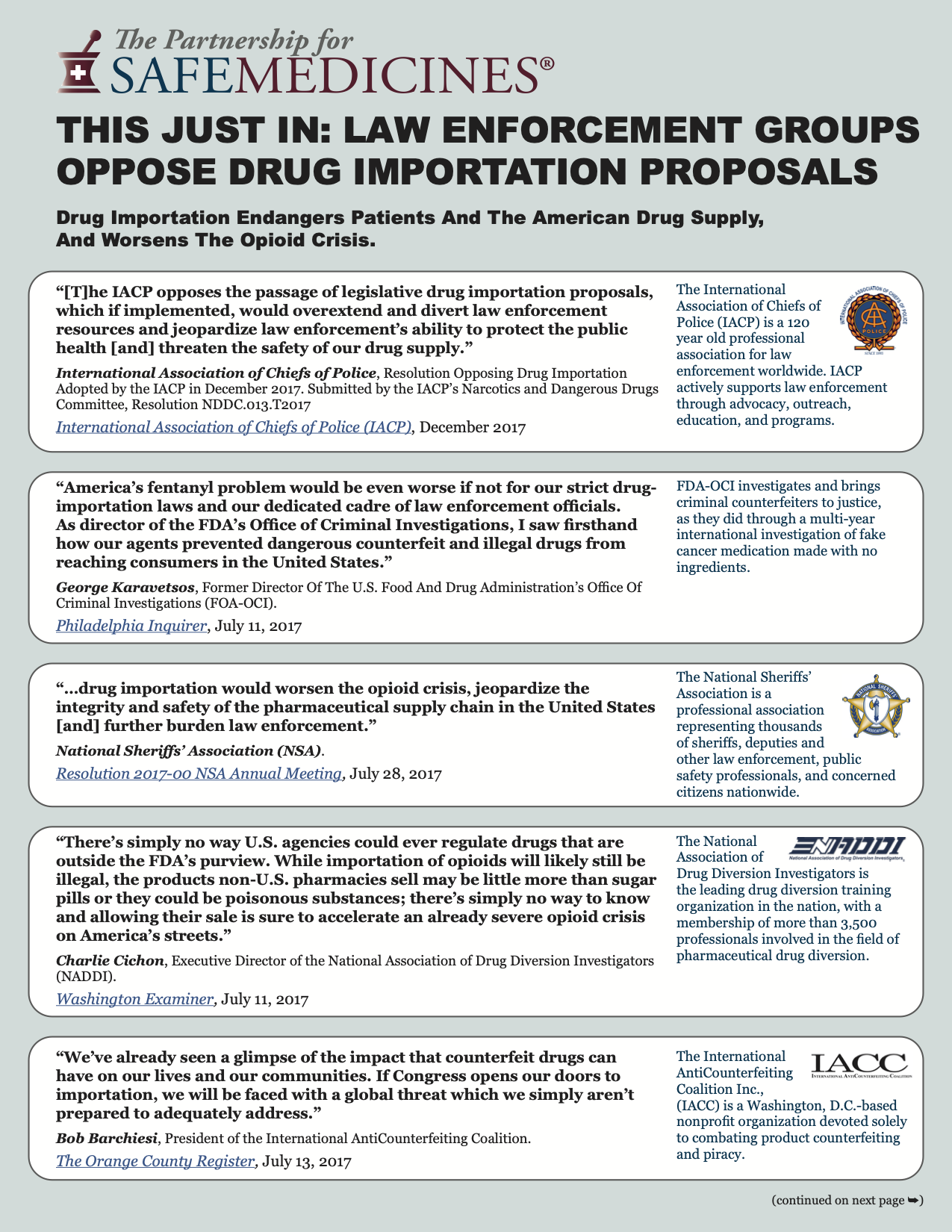This Just In: Law Enforcement Groups Oppose Drug Importation Proposals
Drug importation endangers patients and the American drug supply and worsens the opioid crisis
“[T]he IACP is gravely concerned about the dangers law enforcement personnel and their canine drug detecting partners are subject to each time they come into contact with fentanyl [..] the IACP opposes the passage of legislative drug importation proposals, which if implemented, would overextend and divert law enforcement resources and jeopardize law enforcement’s ability to protect the public health, and threaten the safety of our drug supply...” - International Association of Chiefs of Police (IACP), December 2017
Resolution opposing drug importation adopted by the IACP in December 2017. Submitted by the IACP's Narcotics and Dangerous Drugs Committee, Resolution NDDC.013.t2017 [See PDF]

The International Association of Chiefs of Police (IACP) is a 120 year old professional association for law enforcement worldwide. IACP actively supports law enforcement through advocacy, outreach, education, and programs.
“America's fentanyl problem would be even worse if not for our strict drug-importation laws and our dedicated cadre of law enforcement officials. As director of the FDA's Office of Criminal Investigations, I saw firsthand how our agents prevented dangerous counterfeit and illegal drugs from reaching consumers in the United States.” - Philadelphia Inquirer, July 11, 2017
George Karavetsos, former director of the U.S. Food and Drug Administration's Office of Criminal Investigations (FDA-OCI)
FDA-OCI investigates and brings criminal counterfeiters to justice, as they did through a multi-year international investigation of fake cancer medication made with no ingredients.
“…drug importation would worsen the opioid crisis, jeopardize the integrity and safety of the pharmaceutical supply chain in the United States, further burden law enforcement ...” - Resolution 2017-00 NSA Annual Meeting, July 28, 2017
The National Sheriffs' Association (NSA)

The National Sheriffs' Association is a professional association representing thousands of sheriffs, deputies and other law enforcement, public safety professionals, and concerned citizens nationwide.
“There's simply no way U.S. agencies could ever regulate drugs that are outside the FDA's purview. While importation of opioids will likely still be illegal, the products non-U.S. pharmacies sell may be little more than sugar pills or they could be poisonous substances; there's simply no way to know and allowing their sale is sure to accelerate an already severe opioid crisis on America's streets.” - Washington Examiner July 11, 2017
Charlie Cichon, executive director of the National Association of Drug Diversion Investigators (NADDI)

The National Association of Drug Diversion Investigators is the leading drug diversion training organization in the nation, with a membership of more than 3,500 professionals involved in the field of pharmaceutical drug diversion.
"We’ve already seen a glimpse of the impact that counterfeit drugs can have on our lives and our communities. If Congress opens our doors to importation, we will be faced with a global threat which we simply aren’t prepared to adequately address." - The Orange County Register July 13, 2017
Bob Barchiesi, President of the International AntiCounterfeiting Coalition

The International AntiCounterfeiting Coalition Inc., (IACC) is a Washington, D.C.-based nonprofit organization devoted solely to combating product counterfeiting and piracy.
“Illicit fentanyl... is responsible for the current overdose epidemic….pressed into counterfeit prescription pills, often without the users’ awareness, which leads to overdose incidents.” - 2016 National Drug Threat Assessment Summary
United States Drug Enforcement Agency (DEA)
The U.S. Drug Enforcement Agency enforces the controlled substances laws and regulations of the United States and brings organizations and individuals who break those laws and regulations to the criminal and civil justice system of the United States.
“Drug importation would increase the threat of illegitimate products entering the United States, fueling criminal organizations’ activities and profits.” - Report on the Potential Impact of Drug Importation Proposals on U.S. Law Enforcement
Louis Freeh, Former Federal Bureau of Investigation (FBI) Director
The Federal Bureau of Investigation is the nation's leading law enforcement agency. Among the FBI's priorities are protection of the American people from transnational criminal organizations and enterprises, white-collar crime and high-technology crime.
“Opening the door to increased prescription drug importation will just make it easier for smugglers to ship this dangerous opioid into the United States. For years, we have asked police officers and prosecutors to do more with less. There are few signs that austerity will end. Changing laws to encourage importation of drugs would only add to that burden..” - Inside Sources July 24, 2017
Former Attorneys General Thurbert Baker and Bill McCollum
Thurbert Baker is a former Attorney General of Georgia. Bill McCollum is a former Attorney General of Florida.
The state Attorney General is the top law enforcement officer in a state, prosecuting criminals for violations of state law.
“Legalized prescription drug importation will, undoubtedly, tremendously increase the burden on law enforcement agencies across the country as we battle this epidemic. I am hopeful Congress will eventually see past the political attraction of money-saving drugs, and focus on the dangers that loom ahead of us. After all, their responsibility, like ours, is the protection and safety of their constituents.” - The Kentucky Messenger-Inquirer July 13, 2017
Keith Cain, Daviess County, Kentucky Sheriff, member of the executive board of the National Sheriffs' Association and chairs of its Drug Enforcement Committee
Cain is a 44-year veteran of law enforcement, serves on the executive board of the National Sheriffs' Association and chairs its Drug Enforcement Committee.
“If the Sanders drug importation bill is passed, the dead may soon include patients who thought they were taking legitimate drugs for legal purposes. Right now, the United States has the safest prescription-drug supply chain on the planet, entirely because of the Food and Drug Administration’s stringent restrictions on foreign-drug importation.” - Washington Examiner May 8, 2017
Derek Arnson, the former Chief of Police in Nogales, Arizona
Arnson was appointed Chief of Police for the City of Nogales, AZ in 2012 and served until 2017. He is a native of Arizona and holds a Bachelors Degree in Criminal Justice, a Masters Degree in Education, and a Masters Degree in Security Studies/Homeland Security.
“Right now, fewer than 10 percent of Americans order medicines from abroad, since it is illegal. If importation were legalized, there would be far more packages mailed from Canada to the United States.
Law enforcement doesn’t have the resources to check all these packages for illegal drugs or counterfeit pills. Canadian authorities don’t inspect shipments that originate in other countries and merely pass them through transport hubs en route for America. There would be little stopping a drug lab in China from shipping pure fentanyl or carfentanil straight to dealers or addicts in New Hampshire.” - The New Hampshire Union Leader June 8, 2017
Kevin St. James, Commissioner of Rockingham County in New Hampshire
Kevin St. James is a Commissioner of Rockingham County, New Hampshire. Besides representing the residents of Rockingham community on the Board of Commissioners, he is also an Emergency Medical Technician and Firefighter with the town of Exeter, NH.
